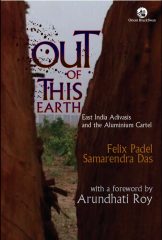Out of This Earth: East India Adivasis and the Aluminium Cartel
By Felix Padel and Samarendra Das
Published by Orient BlackSwan
Aluminium is a metal that many take for granted in hundreds of artifacts but fewer understand where it comes from and its real costs. Behind the shining image of aluminium is a dark side of environmental catastrophes, political manipulations and cultural genocide.
Out of This Earth: East India Adivasis and the Aluminium Cartel written by Felix Padel and Samarendra Das is an extraordinary book that explores the aluminium industry over its entire life cycle, from the mining of Bauxite to its various end uses.
With a foreward by Arundathi Roy it focuses on the Adivasis struggle against mining activities in the state of Odisha (former Orissa). There industrialization is imposed under the guise of development, growth and poverty alleviation, a process that has already displaced thousands of people and destroyed tribal society‘s structures. The book traces a hidden history of how one country after another has swallowed promises of prosperity and plunged into a cycle of exploitation and unrepayable debt. One of the real contributions of Out of This Earth is the commendable effort of the authors to painstakingly trace the forces that actually drive and control the global aluminium industry – how it is driven by a cartel that fuses mining companies, investment bankers, government deals, metals traders and arms manufacturers.
Aluminium has become a product of ‘strategic’ use for war-mongering forces in the world, which naturally push for the growth of the aluminium industry at any cost in order to ensure a constant supply of aircrafts, tanks, bombs and missiles. Out of This Earth quotes the official biography of Alcoa (Aluminum Company of America, one of the world’s oldest and biggest aluminium companies) which states: “War was good to Alcoa”! As the book mentions: “The quest for military supremacy… is a driving force and key source of profit behind aluminium production, now as much as ever.” (pp 284-285).
The ‘profitability’ of the aluminium industry is something that the industry and its sponsors are very fond of projecting. Out of this Earth explains how exactly the manufacture of aluminium is made so ‘profitable’ – through massive state-sponsored tax breaks and subsidies (on land, water and electricity for instance) and more importantly by keeping the price of the main raw material bauxite abysmally low. To explain the essentially unstable nature of the profits made Padel and Das quote the sudden breakdown of Iceland’s entire economy (as a result of what they term ‘aluminium capitalisation’), with high loans amounting to more than ten times what the country really had taken to finance aluminium companies.
The book is a good example of how capitalism and violence are intertwined in the the case of the mining industry. Praful Bidwai, political analyst and activist, referred to the book as a passionate and a factually-rich account of conditions in Odisha, where extreme poverty and great wealth of natural resources exist simultaneously. “The book tells us, in a very engaging way, about what is happening to people who live there, who are profoundly disempowered and have worst of social indices. It brings out how the so-called free market sustains a state of deprivation in Odisha by looking at connections between local and global finance, trade exchanges etc. One can read in the book the quality of sheer violence and brutality in running a system like this, which is based on destroying people,” he said.
During Saving Iceland’s fourth direct action camp, which took place in the summer of 2008, Samarendra Das, one of the authors of Out of This Earth, visited Iceland and spoke publicly about the situation in Orissa, the global effects of aluminium production and the connection between the struggle in Iceland and in India. Some of Samarendra and Padel’s articles have been published on this web:
Agya, What Do You Mean by Development? and Double Death – Aluminum’s Link with Genocide.
